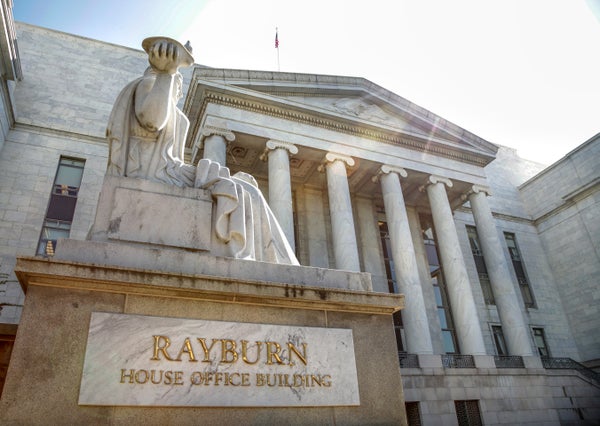
‘Science Fair’ of Lost Research Protests Trump Cuts
A protest at a congressional office building highlighted future research findings that vast cuts to science will erase

Capitol Hill, Washington D.C. | A few dozen scientists protested the cancelling of their research grants by the US government at a ‘science fair’ staged yesterday in Washington D.C. The event, organized by Democrats on a US House of Representatives science committee, is the latest to oppose actions taken by the administration of Republican President Donald Trump to slash US science spending.
Researchers presented posters on how their terminated projects might have benefitted society. They were more upset about how the lost funding might affect young scientists than they were about the end of their own projects. “If you’re training right now as an undergraduate or PhD, do you really want to come into a community that has no funding?” Reuben Harris, a biochemist at the University of Texas Health Science Center at San Antonio, told Nature.
Since Trump took office in January, the US National Institutes of Health, the world’s largest biomedical-science funder, has terminated about 2,900 research grants, according to the database Grant Watch — although about 900 of these might be reinstated after a federal judge ruled that they were cancelled without proper justification. The US National Science Foundation (NSF), another US funding powerhouse, has cancelled more than 1,600 grants. The cuts have targeted research programmes disfavoured by the Trump team, including those investigating the health of gender minorities, the biology underlying COVID-19 and the spread of misinformation. They have also been aimed at some universities, such as Harvard, in Cambridge, Massachusetts, that the administration says have not shielded their students from antisemitism.
On supporting science journalism
If you’re enjoying this article, consider supporting our award-winning journalism by subscribing. By purchasing a subscription you are helping to ensure the future of impactful stories about the discoveries and ideas shaping our world today.
Committee Democrats planned the event, titled ‘The Things We’ll Never Know: A Science Fair of Canceled Grants,’ to highlight the damage of the cuts to the public and to other policymakers. “What’s hard about the politics of fighting for science is that it’s hard to tell people what they’re missing out on. It’s hard to say, ‘Hey, this cancer would have been cured before this cut,’” Suhas Subramanyam, a House Democrat from Virginia, told attendees at the fair. “So this is demonstrating just a small sample of what people are going to be missing through these types of science.”
Lost results
Many of the scientists presenting at the event were a few years into their projects before their funding was cut — wasting money already spent. Julie Cidell, a geographic information scientist at the University of Illinois Urbana–Champaign, was about halfway through her study on how switching to electric-freight vehicles from diesel ones might benefit local communities when the US Environmental Protection Agency cancelled her grant. “We especially wanted to gather air-quality data from individuals — have people walk around their neighbourhoods with individual monitors” to track the difference with electric vehicles (EVs), Cidell said. “That’s the part we can’t do anymore because we don’t have the funding to pay people.”
Katie Shilton, an artificial intelligence (AI) researcher at the University of Maryland in College Park, and her team were building moderator tools to flag misinformation on social-networking platforms such as Discord and Nextdoor. She had already spent four years working with online communities to develop the AI tools when the NSF cancelled the grant. “We built this tool. We started coding it,” Shilton says. “We had to dismiss our student who was coding the tool right away. Our graduate students lost their summer funding. And we can’t finish.”
Along with several others at the fair, Jessica Rosenberg, an astrophysicist who studies science, technology, engineering and mathematics (STEM) education at George Mason University in Fairfax, Virginia, pointed out the effects of cancelled grants on junior scientists. Rosenberg was in the process of hiring team members to study methods of educating students about quantum technology when the news landed that her NSF money was cut. Three postdoctoral students “had just finished signing letters turning down their other offers and were supposed to start mid-August” when the funding for the new positions vanished, she told Nature.
“I’m really scared for our students and junior colleagues,” Shilton said. “I’ve had a great career even if I don’t get any more science funding. But how are my students going to do science?”
White House spokesman Kush Desai said of the science fair: “By slashing waste, fraud and abuse, and realigning research spending, the Trump administration is strengthening America’s research apparatus to better deliver on the priorities of the American people — which do not include AI moderators for online forums or more justifications for EV mandates.”
Presenters and committee members at the event expressed concern that the halting of so much research could sink US leadership in science. “We’re putting ourselves in the situation of sacrificing our place as the world leader in biotechnology and antiviral-drug development to other countries,” Harris said.
Subramanyam said that, perhaps that loss of leadership is the wake-up call the United States needs. If China surpassing the United States “is the only way to get people here to pay attention, then let China do it,” he said when answering a question from the press about China’s investment in space science at the fair. “Yes, we’re going to lose our leadership in science, technology, research and innovation if we continue to make cuts.”
This article is reproduced with permission and was first published on July 9, 2025.
Source link




